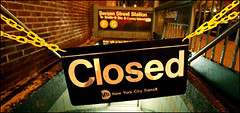Transit workers go on strike
Easy for me to say, observing from the car-choked suburbs, but listening to callers on the radio this morning, it's obvious New Yorkers (and we former New Yorkers now ensconced north of the City), have a fairly ambivalent view of the strike. We'll see how that mood lasts if the strike goes on for a week, or 16 days as it did in 1966. But in the meantime, most New Yorkers seem a little annoyed with the inconvenience, but surprisingly supportive of the strikers. Although it's hard to sympathize with workers striking over a pension, when most of the workers who rely on the subways to get to work these days can expect no guaranteed pension from their own employers, we know that working for the city, for the MTA, and the NYPD and FDNY, were tickets to the middle class. That's no longer the case. Starting salaries for the police and fire departments are $25,000 a year. $25,000...in New York. That's not a living wage (wages do ratchet up pretty quickly, I understand, but still given the occupations we're talking about...).
New York City has lost its industrial base and with it, a means for the City's working poor to climb to a middle class lifestyle. The City has become one of income extremes -- of extreme wealth and of poverty moved farther away from Manhattan and Park Slope -- and for those who care about the City and what it's stood for since the end of WWII, that's worrying. And as for those walking to work today, they know they're just one outsourcing initiative from not having a job to go to, so the union's militancy feels a little like, well, at least someone's sticking it to The Man and fighting, as one caller I heard this morning say, the ongoing race to the bottom for workers.
The other bit of ambivalence is that, for lots of people, especially commuters from the 'burbs, it ain't 1966. The strike isn't bringing the City to its knees. The Internets, baby. A lot of people are starting the holidays early...I mean, working from home.
Oh, and a tip if you live or work around 6th Ave or the Village. The PATH train is still operating. And it's 50 cents cheaper than the subway.
New York City has lost its industrial base and with it, a means for the City's working poor to climb to a middle class lifestyle. The City has become one of income extremes -- of extreme wealth and of poverty moved farther away from Manhattan and Park Slope -- and for those who care about the City and what it's stood for since the end of WWII, that's worrying. And as for those walking to work today, they know they're just one outsourcing initiative from not having a job to go to, so the union's militancy feels a little like, well, at least someone's sticking it to The Man and fighting, as one caller I heard this morning say, the ongoing race to the bottom for workers.
The other bit of ambivalence is that, for lots of people, especially commuters from the 'burbs, it ain't 1966. The strike isn't bringing the City to its knees. The Internets, baby. A lot of people are starting the holidays early...I mean, working from home.
Oh, and a tip if you live or work around 6th Ave or the Village. The PATH train is still operating. And it's 50 cents cheaper than the subway.



0 Comments:
Post a Comment
<< Home